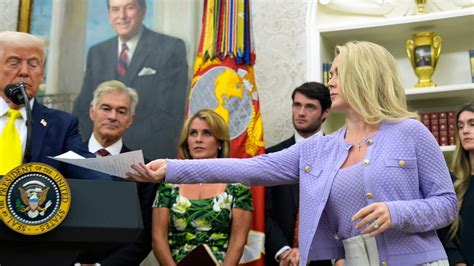
Treasury spokesperson Karine Leavitt abruptly ended a press briefing on Monday after facing persistent questions regarding her past controversial social media posts and statements, reigniting the debate over free speech and political accountability within the Biden administration.
Leavitt, who was appointed as a Treasury Department spokesperson earlier this year, was addressing reporters on economic matters when questions shifted to her history of criticizing prominent Democrats and promoting unsubstantiated claims. The questioning intensified, focusing specifically on statements made before her government appointment that were perceived as inflammatory and partisan. According to sources present at the briefing, the line of inquiry led to Leavitt stating, “I’m here to discuss the economy,” before ultimately walking away from the podium.
The exchange has sparked a wider discussion about the balance between free speech rights and the responsibilities of government officials, particularly concerning pre-appointment statements. Critics argue that Leavitt’s past pronouncements undermine her credibility and objectivity in her current role, while supporters defend her right to express personal opinions, even if controversial.
The Treasury Department has not yet released an official statement regarding the incident.
The confrontation occurred as Leavitt was responding to queries about the administration’s strategies to combat inflation and promote economic growth. After addressing several economic issues, reporters began probing her about her past social media activity, including tweets and retweets that were critical of Democratic figures and pushed conspiracy theories.
“The questioning became increasingly pointed, with reporters citing specific examples of her past statements and asking whether she stood by those views,” said one journalist who attended the briefing. This journalist wished to remain anonymous, citing concerns over potentially damaging relationships with the Treasury Department.
Leavitt initially attempted to steer the discussion back to economic policy, stating, “I’m here to talk about the important work we’re doing to strengthen the economy and create opportunities for all Americans.” However, the reporters persisted, pressing her on whether her past statements were consistent with the Biden administration’s values of inclusivity and respect.
According to multiple accounts, Leavitt became visibly frustrated as the line of questioning continued. After repeated attempts to redirect the conversation, she reportedly said, “I’m here to discuss the economy. I think we’ve addressed this issue,” before gathering her notes and exiting the briefing room.
The incident has drawn immediate reactions from both sides of the political spectrum. Conservative commentators have accused the media of engaging in a “witch hunt” against Leavitt, arguing that her past statements are irrelevant to her current role. They assert that the press is unfairly targeting her for expressing opinions that are common among conservatives.
“This is just another example of the liberal media trying to silence conservative voices,” said one prominent conservative blogger. “They’re trying to punish Karine Leavitt for having the audacity to express her views before she joined the government. It’s a clear violation of her free speech rights.”
Conversely, liberal commentators have argued that Leavitt’s past statements raise legitimate concerns about her ability to perform her job impartially. They contend that her history of spreading misinformation and attacking political opponents calls into question her judgment and credibility.
“It’s not about silencing conservative voices; it’s about holding public officials accountable for their past actions,” said a liberal commentator. “Karine Leavitt’s history of spreading conspiracy theories and attacking Democrats is deeply troubling, and it’s fair to ask whether she can be trusted to represent the Treasury Department with integrity.”
Several legal experts have weighed in on the matter, offering varying perspectives on the legal and ethical implications of Leavitt’s situation. Some argue that her past statements are protected by the First Amendment and that it would be unconstitutional to punish her for expressing her views. Others contend that her position as a government spokesperson carries certain responsibilities and that her past statements could be grounds for disciplinary action.
“The First Amendment protects the right to free speech, but it’s not absolute,” said a constitutional law professor. “Government employees can be held accountable for their speech if it interferes with their ability to perform their job duties or if it undermines public trust in the government.”
The incident involving Leavitt has also sparked a broader debate about the role of social media in politics and the standards to which government officials should be held. Many argue that social media has blurred the lines between personal and professional conduct, making it more difficult to distinguish between private opinions and official statements.
“Social media has changed the game in politics,” said a political science professor. “In the past, government officials could keep their personal views separate from their professional roles. But now, everything is out in the open, and it’s much harder to control the narrative.”
This is not the first time that a political appointee’s past social media activity has caused controversy. In recent years, numerous government officials have faced scrutiny for their past statements, leading to resignations, firings, and public apologies.
The White House has not yet commented directly on the incident involving Leavitt. However, administration officials have previously stated that they expect all government employees to conduct themselves with integrity and respect.
The Treasury Department is now facing pressure to address the situation and clarify its position on the matter. Some are calling for an internal investigation into Leavitt’s past statements, while others are demanding that she issue a public apology.
As the controversy continues to unfold, it is likely to further intensify the debate over free speech, political accountability, and the role of social media in government. The incident serves as a reminder of the challenges facing government officials in the age of social media and the importance of maintaining a high standard of conduct.
The abrupt departure of Karine Leavitt from the press briefing has added another layer of complexity to the ongoing debate about the intersection of free speech and government responsibility, particularly in the context of rapidly evolving digital communication platforms.
Expanding the Context and Analysis:
The situation involving Karine Leavitt highlights several critical aspects of contemporary political discourse and governance. These include the evolving understanding of free speech in the digital age, the standards of accountability expected from public officials, and the increasing polarization of political opinion.
Free Speech in the Digital Age:
The First Amendment to the United States Constitution guarantees the right to free speech, but the scope and limitations of this right have been a subject of ongoing debate and interpretation. The advent of social media has introduced new dimensions to this debate, as individuals can now communicate with a global audience instantly and easily.
In the context of government officials, the right to free speech is not absolute. Courts have recognized that government employees can be subject to certain restrictions on their speech, particularly if their speech interferes with their job duties or undermines public trust in the government. The Supreme Court case Pickering v. Board of Education (1968) established a balancing test for determining when a public employee’s speech is protected by the First Amendment. This test requires courts to weigh the employee’s interest in expressing themselves on matters of public concern against the government’s interest in maintaining an efficient and effective workplace.
In Leavitt’s case, the question is whether her past social media posts, which were made before she joined the government, are relevant to her ability to perform her job as a Treasury Department spokesperson. Some argue that her past statements are protected by the First Amendment and that it would be unfair to punish her for expressing her views. Others contend that her position as a government spokesperson carries certain responsibilities and that her past statements could undermine her credibility and effectiveness.
Accountability of Public Officials:
The incident involving Leavitt also raises important questions about the standards of accountability expected from public officials. In a democracy, public officials are expected to act in the public interest and to uphold the values of transparency, integrity, and impartiality.
When public officials make statements that are perceived as biased, misleading, or offensive, it can erode public trust in the government and undermine their ability to perform their job duties effectively. This is particularly true in the age of social media, where statements can quickly go viral and be amplified by partisan actors.
Critics argue that Leavitt’s past social media posts raise legitimate concerns about her ability to represent the Treasury Department impartially. They point to her history of criticizing Democrats and promoting unsubstantiated claims as evidence that she may be biased and that she may not be able to provide objective information to the public.
Supporters, on the other hand, argue that Leavitt is entitled to her own opinions and that her past statements should not be held against her. They contend that she is a talented and capable communicator and that she should be given the opportunity to prove herself in her new role.
Political Polarization:
The controversy surrounding Leavitt also reflects the increasing polarization of political opinion in the United States. In recent years, the gap between Democrats and Republicans has widened on a range of issues, from economic policy to social issues. This polarization has made it more difficult for people to engage in civil discourse and to find common ground.
In the context of the Leavitt incident, the polarization of political opinion has led to sharply divided reactions. Conservatives have rallied to Leavitt’s defense, accusing the media of engaging in a “witch hunt” and trying to silence conservative voices. Liberals, on the other hand, have criticized Leavitt’s past statements and questioned her ability to perform her job impartially.
The polarization of political opinion makes it more difficult to have a nuanced and balanced discussion about the issues at stake. It also makes it more difficult to find solutions that can bridge the divide between Democrats and Republicans.
Treasury Department’s Response:
The Treasury Department’s response to the incident involving Leavitt will be closely watched by observers on both sides of the political spectrum. The department’s actions will likely have a significant impact on the ongoing debate about free speech, political accountability, and the role of social media in government.
If the Treasury Department decides to take disciplinary action against Leavitt, it could send a message that government officials will be held accountable for their past statements, even if those statements were made before they joined the government. This could deter other government officials from making controversial or offensive statements on social media.
On the other hand, if the Treasury Department decides not to take any action against Leavitt, it could send a message that government officials have broad discretion to express their views, even if those views are controversial or offensive. This could embolden other government officials to make similar statements on social media.
The Treasury Department’s decision will likely be influenced by a variety of factors, including legal considerations, political considerations, and public opinion. It remains to be seen how the department will ultimately resolve this complex and sensitive issue.
Potential Implications:
The incident involving Karine Leavitt could have several potential implications for the Biden administration and for the broader political landscape.
First, it could damage the credibility of the Treasury Department and undermine its ability to communicate effectively with the public. If Leavitt’s past statements continue to be a source of controversy, it could make it more difficult for her to represent the department with authority and integrity.
Second, it could embolden other political appointees to make controversial or offensive statements on social media. If Leavitt is not held accountable for her past statements, it could send a message that there are no consequences for such behavior.
Third, it could further intensify the polarization of political opinion in the United States. The incident has already sparked a heated debate between conservatives and liberals, and it could further widen the gap between the two sides.
Fourth, it could lead to increased scrutiny of the social media activity of other government officials. The incident has highlighted the potential risks associated with social media, and it could lead to increased efforts to monitor and regulate the online behavior of government employees.
Ultimately, the long-term impact of the incident involving Karine Leavitt remains to be seen. However, it is clear that the incident has raised important questions about free speech, political accountability, and the role of social media in government.
Frequently Asked Questions (FAQ):
1. What specifically did Karine Leavitt say or post on social media that led to the controversy?
While the article doesn’t provide exact quotes of Leavitt’s social media posts, it indicates that they were critical of prominent Democrats and promoted unsubstantiated claims and conspiracy theories. These statements, made before her appointment as Treasury spokesperson, are now being scrutinized for their potential impact on her ability to perform her job impartially. It’s important to note that specifics are avoided by the original source, and therefore not included to prevent speculation and to maintain accuracy.
2. What are the legal implications of holding a government spokesperson accountable for past social media posts?
The legal implications are complex and hinge on the balance between the First Amendment right to free speech and the responsibilities of a government employee. The Supreme Court’s Pickering v. Board of Education case provides a framework for this balance, weighing the employee’s interest in free speech against the government’s interest in maintaining an efficient workplace and public trust. If Leavitt’s past statements significantly undermine her credibility or ability to perform her duties, disciplinary action could be considered. However, such action could also face legal challenges based on First Amendment grounds.
3. How does this incident compare to other cases where political appointees have faced scrutiny for their past social media activity?
This incident is part of a growing trend of political appointees facing scrutiny for past social media activity. Numerous similar cases have resulted in resignations, firings, or public apologies. The common thread is the tension between personal expression and the standards expected of public officials. Each case is unique, however, depending on the nature of the statements, the position held, and the specific context.
4. What is the Treasury Department’s official stance on its employees’ social media activity, both before and during their tenure?
As of the article’s writing, the Treasury Department has not released an official statement regarding this specific incident or its broader policy on employee social media activity. However, administration officials have previously stated that they expect all government employees to conduct themselves with integrity and respect. The absence of a specific policy statement leaves room for interpretation and adds to the uncertainty surrounding the department’s next steps.
5. What are the potential consequences for Karine Leavitt as a result of this incident?
The potential consequences for Karine Leavitt range from no action to disciplinary measures, including potential termination. The Treasury Department could conduct an internal investigation to assess the impact of her past statements on her ability to perform her duties. Public pressure and political considerations will likely influence the department’s decision, which could also set a precedent for future cases involving government employees and their social media activity. A public apology is another potential outcome.
Further In-Depth Analysis:
The abrupt departure of Karine Leavitt from the press briefing serves as a microcosm of larger societal and political trends that are shaping the landscape of public discourse and governance. The incident underscores the challenges of navigating free speech rights in the digital age, the evolving expectations of accountability for public officials, and the pervasive influence of political polarization on public perception and opinion.
The Transformation of Public Discourse in the Digital Age:
The rise of social media platforms has fundamentally altered the dynamics of public discourse. These platforms have democratized access to information and provided individuals with unprecedented opportunities to express their opinions and engage in dialogue with a global audience. However, this democratization has also come with its own set of challenges.
One of the key challenges is the erosion of traditional gatekeepers of information. In the past, journalists and media outlets played a crucial role in filtering and verifying information before it was disseminated to the public. With the advent of social media, individuals can now bypass these gatekeepers and share information directly with their followers, regardless of its accuracy or reliability. This has led to the proliferation of misinformation, disinformation, and conspiracy theories, which can have a significant impact on public opinion and decision-making.
Another challenge is the increasing echo chambers and filter bubbles that are created by social media algorithms. These algorithms are designed to show users content that is tailored to their interests and preferences, which can reinforce existing biases and limit exposure to diverse perspectives. This can lead to increased polarization and make it more difficult for people to engage in civil discourse with those who hold different views.
The Evolving Expectations of Accountability for Public Officials:
In the past, public officials were primarily judged on their performance in office and their adherence to ethical standards. However, with the rise of social media, public officials are now subject to greater scrutiny than ever before. Their past statements and actions, both personal and professional, are often unearthed and scrutinized by the media and the public.
This increased scrutiny has led to a heightened sense of accountability for public officials. They are now expected to be more transparent, responsive, and accountable for their actions, both online and offline. This can be a challenge for public officials, who must balance their right to express their opinions with their responsibility to maintain public trust and confidence.
The case of Karine Leavitt highlights the challenges of navigating these competing demands. As a Treasury Department spokesperson, Leavitt is expected to represent the administration’s policies and communicate effectively with the public. However, her past social media posts have raised questions about her ability to perform this role impartially.
The Pervasive Influence of Political Polarization:
The United States has become increasingly polarized in recent decades, with Democrats and Republicans holding increasingly divergent views on a wide range of issues. This polarization has made it more difficult for people to engage in civil discourse and to find common ground.
The case of Karine Leavitt has been heavily influenced by this political polarization. Conservatives have rallied to Leavitt’s defense, accusing the media of engaging in a “witch hunt” and trying to silence conservative voices. Liberals, on the other hand, have criticized Leavitt’s past statements and questioned her ability to perform her job impartially.
This polarization makes it difficult to have a nuanced and balanced discussion about the issues at stake. It also makes it more difficult to find solutions that can bridge the divide between Democrats and Republicans.
The Implications for the Biden Administration:
The incident involving Karine Leavitt poses a challenge for the Biden administration. On the one hand, the administration wants to uphold the values of free speech and diversity of opinion. On the other hand, it also wants to ensure that its officials are able to perform their duties effectively and maintain public trust.
The administration’s response to the Leavitt incident will likely be carefully calibrated to balance these competing considerations. It is possible that the administration will issue a statement reaffirming its commitment to free speech while also emphasizing the importance of accountability for public officials. It is also possible that the administration will take disciplinary action against Leavitt, although this would likely be controversial.
Ultimately, the outcome of the Leavitt incident will depend on a variety of factors, including legal considerations, political considerations, and public opinion. However, the incident serves as a reminder of the challenges facing government officials in the age of social media and the importance of maintaining a high standard of conduct.
The situation emphasizes the need for organizations, including government agencies, to have comprehensive and clearly articulated social media policies that address both pre-employment and post-employment conduct. These policies should provide guidance on what types of speech are permissible and what types of speech could lead to disciplinary action. They should also be regularly reviewed and updated to reflect the evolving landscape of social media.
Furthermore, the incident underscores the importance of due diligence in the vetting process for political appointees. Thoroughly reviewing candidates’ social media activity can help to identify potential red flags and avoid controversies down the road. This vetting process should be conducted in a fair and impartial manner, and it should take into account the context in which the statements were made.









